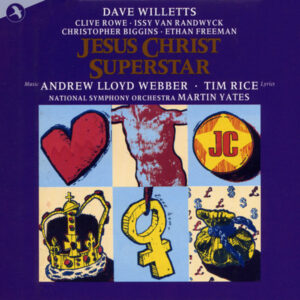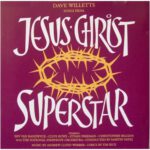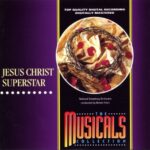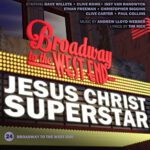Artwork
Cast
Jesus of Nazareth…………Dave Willetts
Judas Iscariot…………Clive Rowe
Mary Magdalene…………Issy Van Randwyck
Pontius Pilate…………Ethan Freeman
King Herod…………Christopher Biggins
Simon Zealotes…………Paul Collis
Caiaphas…………Billy Hartman
Annas…………Chris Corcoran
Peter…………Clive Carter
Maid by the Fire…………Shona Lindsay
Old Man…………Peter Hickmet
Priests…………Andrew Halliday, Jay Marcus, Andrew Newey
Soldiers…………Nic Colicos, Philip Day
Orchestra
Credited to National Symphony Orchestra (leader: Perry Montague-Mason)
Audio Production Information
Executive Producer: John Yap
Produced for Record by John Yap
Recording Engineer: John Kurlander
Editing Engineer: Ben Turner
Release Co-ordination: Jessica Lim
Orchestra Conducted by Martin Yates
Cover Illustrations: Eoghan Carberry
CD Graphics: Barbel Graphics
Recorded at Abbey Road Studios, London, on June 3-5, 1993, March 29-31, July 25, October 18, 22, November 3, 4, 22, 1994
Digital Editing at Finesplice Studios
℗ 1995 Jay Productions Ltd.
© Music Collection International Ltd.
Track Listing
Act 1:
Overture
Heaven On Their Minds
What’s The Buzz
Strange Thing, Mystifying
Everything’s Alright
Jesus Must Die
Hosanna
Simon Zealotes
Poor Jerusalem
Pilate’s Dream
The Temple
Everything’s Alright (Reprise)
I Don’t Know How To Love Him
Damned For All Time/Blood Money
Act 2:
The Last Supper
Gethsemane
The Arrest
Peter’s Denial
Pilate And Christ
Herod’s Song
Judas’ Death
Trial By Pilate (The 39 Lashes)
Superstar
Crucifixion
John 19:41
Could We Start Again Please?
Historical Notes from a Fan
The ship has long since sailed on capitalizing on the success of Jesus Christ Superstar in the same way that “knock-off” recordings long had. But “budget” labels famous for releasing low-cost sound-alike albums still exist. So it’s not hard to imagine that these recordings (this is the point where the classification “studio cast” begins to apply more since one can no longer accurately say they are riding the coattails of a specific production) continued to flourish, and still do to this day. With all studio cast recordings, it’s generally the opinion of this particular fan that since the performers lack the experience of getting on a stage and performing the show in front of an audience, the performances are pleasant enough, but not always up to par with a real cast album.
JAY Records (a London-based subsidiary of That’s Entertainment Records International Ltd., which represents the recordings of TER, JAY Records, and JAY Productions, and sells its music worldwide under the JAY and TER imprints) has specialized in recording West End and Broadway shows and artists for over a quarter of a century in the highest audio quality. Their catalog’s range is extensive, covering everything from film soundtracks to musical theater. One of their most popular lines, however, is the Masterworks Edition, which they define as “full-length recordings using original orchestrations and full orchestras just as the composers originally intended.” (Your mileage may vary; while they are generally useful for their completeness, cast wise the recordings are usually solid readings of the classics but nothing extraordinary.) As musical theater pieces in general rarely get such true and lavish treatment, in theory, one should be grateful that JAY decided to tackle a Masterworks Edition of JCS during its early Nineties resurgence of popularity. That is until one listens to it.
The liner notes boast that “[t]his landmark of British musicals has been reproduced in its original full symphonic conception which is often sadly lost on stage due to restrictive orchestra size. In this recording, the 60-piece orchestrations with added Digital Dolby Surround depth offer the listener a definitive recording of this classic work.” Well, whatever the technical quality of the recording, they could have tried upping the rhythm quotient in the music department; even in Andrew Lloyd Webber’s later precision-honed revivals, this reviewer has never heard another recording of the score in which the “rock” in “rock opera” was so watered-down (practically to the level of flat-lining), with the orchestra — a resident ensemble and conductor used on many JAY recordings of the era — seeming to treat the piece as though they were recording My Fair Lady. Still, it’s noteworthy for including an instrumental “tag” at the end of “The Temple” which only appeared in early stage productions, and for the bemusing version of “Could We Start Again Please?” tacked on at the end as an appendix/bonus track.
As far as the cast goes, “one-note” is generally the order of the day. We’ll consider this piece by piece. First, the recording boasts “a fascinating ‘battle’ of the Phantoms between Dave Willetts (Jesus Christ) and Ethan Freeman (Pilate) both of whom played the Phantom on the West End stage and elsewhere.”
In comparing the two, Willetts frankly sounds like he’s still playing the Phantom on this recording; when attempting to find one word to describe his performance, “angry” easily comes to mind. He snarls through the role of Christ, seemingly raging at everybody in the immediate vicinity and coming off as more evil than any of the priests (all of whom lack power and punch) with his darker sound, and when he tries to show that he’s capable of rocking out, it results in embarrassingly painful vocal ad-libs and appalling overacting. Memo to all theater performers cast in rock/pop musicals: shouting “YEAAAAAH!” wherever you can isn’t going to fool people into thinking you’re any more authentic. Even when he makes a genuine acting choice, such “innovation” as “I’ll show you how to die” in “Gethsemane” is outright laughable and arguably more blasphemous to traditional Christians than anything that’s part of the script in JCS. (In fairness, having heard Willetts’ live performance as a replacement on the Paul Nicholas tour that spawned the 20th anniversary London cast recording, he doesn’t seem to hold back as much as on the album, where he seemed to completely lack power, and sounds a lot better. One wonders what happened in the studio.)
Switching gears to Ethan Freeman, while the role of Pilate is generally one where this reviewer considers the acting more important than singing, he certainly comes off better than his fellow Phantom, turning in a fine performance indeed and almost certainly walking away as the highlight of the album. His portrayal sounds genuine, and while he does seem to have some issues near the end of the Trial sequence, he still does a solid job.
About the other leads:
- Clive Rowe uses his impressive range to decent effect as Judas, although he becomes unintelligible when he tries to show off on the high notes, coming dangerously close to being received as one album-length yell (though thankfully the yell is on key). Further, as Judas is the story’s main focus, it is disheartening to hear very little characterization in his portrayal; it sounds forced and fake, and while there is occasional potential for him to shine, he never takes advantage of it. Still, his mighty, powerhouse voice makes up for a lot of that.
- Paul Collis is a solid Simon.
- Christopher Biggins, a legendarily camp actor and TV presenter best known for playing Lukewarm on BBC’s Porridge (and known by fans of the cult fave Rocky Horror as a Transylvanian in the film cast), turns in a generic Herod, even less memorable than his turn as the Baker in the direct-to-video Joseph.
- And last but not least, Issy Van Randwyck (on whom JAY lavishes praise, touting her as “the only non-mainstream pop singer to appear on the recent platinum recording The Glory of Gershwin (other singers included Meat Loaf, Cher, Enya, etc.)” and calling her “stunning performance” “surely an early preview of a superstar in the making”) decidedly does not live up to the label’s hype. She’s fine, good really, but nothing impressive, and for that ultimately rather boring.
If you’re the rare JCS fan who also enjoys the sound of large orchestras more than rock instruments, you’ll probably like this album. But by and large, this reviewer would recommend only purchasing the album if one is a completist.
Reviews
There are no reviews yet. Be the first one to write one.





